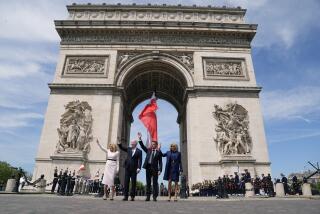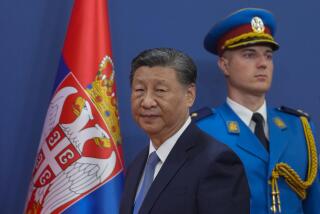In Paris, Milosevic Gets VIP Treatment
PARIS â Having failed so far with military threats and economic sanctions, U.N. negotiators turned to champagne, cuisine and Franceâs historical ties to Serbia in the latest effort to win over Serbian President Slobodan Milosevic and restart the stalled international peace talks on Bosnia-Herzegovina.
The Serbian leader, increasingly isolated on the world stage but a hero to the nationalist Serbian forces fighting in Bosnia, was feted with all the fanfare normally reserved for a head of state. First he met for two hours with U.N. envoys and French President Francois Mitterrand at the Elysee Palace. Then he was treated to a dinner at the French Foreign Ministry that Mitterrand attended.
Despite the VIP treatment, Milosevic gave no overt sign of having shifted his position on the conflict.
But the two envoys assigned to the conflict, the United Nationsâ Cyrus R. Vance and the European Communityâs Lord Owen, said after the three-hour dinner that lasted late into the night that they made unspecified âprogressâ with Milosevic. They said they will have follow-up discussions in New York on Monday or Tuesday with leaders of the Bosnian Serbs.
Fresh from extensive discussions in Washington with President Clinton on the Bosnian conflict, Mitterrand had invited Milosevic, Vance and Owen to Paris for more talks on the proposed U.N. peace plan to divide Bosnia into 10 ethnic provinces.
Bosnia-Herzegovina, where ethnic Muslim Slavs are in the majority, voted to be independent from Yugoslavia last March. Serbs in the republic, initially aided by the Serbian-dominated federal Yugoslav army, rebelled and declared their own republic within Bosnia. In fierce fighting over the subsequent months, Serbian forces have captured two-thirds of Bosnian territory.
In territory that they hold, the Serbs have engaged in what is called âethnic cleansingâ--killing or intimidating non-Serbs to drive them out.
Intervening in the discussions, Mitterrand reminded Milosevic, the Serbian nationalist leader considered the key to any settlement, of what were described as âmovingâ accounts of historical links between France and Slavic nationalist movements that date to the 19th-Century Austro-Hungarian Empire.
Of all the Western powers, France has kept the most open diplomatic contacts with the Serbian regime in Belgrade. Mitterrand last met with Milosevic in 1991. But even after the U.N. Security Council last May imposed economic sanctions on Serbia and Montenegro, the two remaining republics of the old Yugoslavia, a senior bureaucrat in the French Foreign Ministry made two official visits to Belgrade.
According to Owen, Mitterrand referred to his discussions with Clinton this week and warned Milosevic of a new international consensus to âreactâ with tougher sanctions and possible military intervention if a settlement is not reached soon.
In response, Milosevic continued to downplay his influence over the Serbian forces inside war-torn Bosnia. He called again for a cease-fire by all sides in the conflict and said the U.N. economic sanctions must be lifted before an accord can be reached.
âIt should be much more clear that the embargo will be lifted,â Milosevic told reporters after leaving the Elysee Palace in the evening. âWe want to cooperate on an equal footing, but we are not on an equal footing with the embargo still in effect.â
Owen said later that lifting the sanctions was the subject of more talks.
As Milosevic met with the U.N. negotiators and French officials, several hundred demonstrators marched in a Left Bank protest. The demonstrators carried signs describing the Serbian leader as a ârapist and murderer.â
In Bosnia, meanwhile, U.N. relief forces gained some access to embattled Muslim pockets in the east after days of bargaining with Serbs but were unable to deliver any aid. U.N. vehicles reached one of the enclaves, Konjevic Polje, but angry locals detained the British soldiers in the convoy in a dispute over who was to be evacuated.
A convoy carrying 80 tons of aid to the besieged enclave of Srebrenica was still stalled outside the region, according to the Belgrade office of the U.N. refugee agency. The U.N. commander, French Gen. Philippe Morillon, tried to reach the town, but one of the vehicles he was traveling with hit a land mine.
More to Read
Sign up for Essential California
The most important California stories and recommendations in your inbox every morning.
You may occasionally receive promotional content from the Los Angeles Times.










